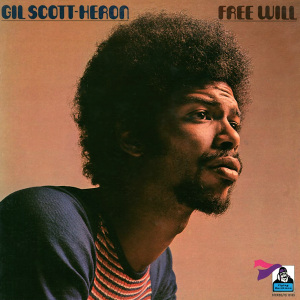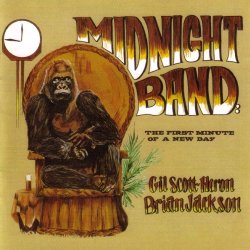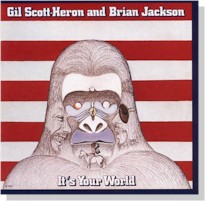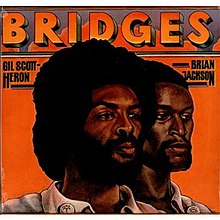
Gilbert Scott-Heron was an American jazz poet, singer, musician, and author known for his work as a spoken-word performer in the 1970s and 1980s. His collaborative efforts with musician Brian Jackson fused jazz, blues, and soul with lyrics relative to social and political issues of the time, delivered in both rapping and melismatic vocal styles. He referred to himself as a "bluesologist", his own term for "a scientist who is concerned with the origin of the blues". His poem "The Revolution Will Not Be Televised", delivered over a jazz-soul beat, is considered a major influence on hip hop music.

Musicians United for Safe Energy, or MUSE, is an activist group founded in 1979 by Jackson Browne, Graham Nash, Bonnie Raitt, Harvey Wasserman and John Hall. The group advocates against the use of nuclear energy, forming shortly after the Three Mile Island nuclear accident in March 1979. MUSE organized a series of five No Nukes concerts held at Madison Square Garden in New York in September 1979. On September 23, 1979, almost 200,000 people attended a large rally staged by MUSE on the then-empty north end of the Battery Park City landfill in New York.
John Grant Fuller, Jr. was a New England–based American author of several nonfiction books and newspaper articles, mainly focusing on the theme of extraterrestrials and the supernatural. For many years he wrote a regular column for the Saturday Review magazine, called "Trade Winds". His books include We Almost Lost Detroit, The Ghost of Flight 401, Incident at Exeter, and The Interrupted Journey.

No Nukes: The Muse Concerts For a Non-Nuclear Future was a 1979 triple live album that contained selections from the September 1979 Madison Square Garden concerts by the Musicians United for Safe Energy collective. Jackson Browne, Graham Nash, Bonnie Raitt, and John Hall were the key organizers of the event and guiding forces behind the album.

No Nukes is a 1980 documentary and concert film that contained selections from the September 1979 Madison Square Garden concerts by the Musicians United for Safe Energy collective, with Jackson Browne, Graham Nash, Bonnie Raitt, and John Hall being the key organizers of the event and guiding forces behind the film. Also included were scenes of the organizers getting the event together, expounding upon the dangers of nuclear power, and staging an anti-nuclear rally at Battery Park in New York City.

From South Africa to South Carolina is a studio album by the American vocalist Gil Scott-Heron and the keyboardist Brian Jackson. It was released in November 1975 by Arista Records. Scott-Heron performed "Johannesburg" and "A Lovely Day" on Saturday Night Live in December 1975. The album was reissued in the late 1990s via Scott-Heron's Rumal-Gia label, distributed by TVT Records.

Pieces of a Man is the debut studio album by American poet Gil Scott-Heron. It was recorded in April 1971 at RCA Studios in New York City and released later that year by Flying Dutchman Records. The album followed Scott-Heron's debut live album Small Talk at 125th and Lenox (1970) and departed from that album's spoken word performance, instead featuring compositions in a more conventional popular song structure.

Winter in America is a studio album by American vocalist Gil Scott-Heron and keyboardist Brian Jackson. It was recorded in September to October 1973 at D&B Sound Studio in Silver Spring, Maryland and released in May 1974 by Strata-East Records. Scott-Heron and Jackson produced the album in a stripped-down fashion, relying on traditional African and R&B sounds, while Jackson's piano-based arrangements were rooted in jazz and the blues. The subject matter on Winter in America deals with the African-American community and inner city in the 1970s.

Free Will is the second studio album by American poet Gil Scott-Heron, released in August 1972 on Flying Dutchman Records. Recordings sessions for the album took place on March 2 and 3, 1972 at RCA Studios in New York City, and production was handled by producer Bob Thiele. It is the follow-up to Scott-Heron's critically acclaimed studio debut, Pieces of a Man (1971), and it is the second album to feature him working with keyboardist Brian Jackson. Free Will is also Scott-Heron's final studio album for Flying Dutchman. The album reissued on compact disc in 2001 by Bluebird Records with alternative takes of eight tracks from the original album.

The First Minute of a New Day is an album by American vocalist Gil Scott-Heron, keyboardist Brian Jackson, and the Midnight Band—an eight-piece musical ensemble. It was released in January 1975 on Arista Records. Recording sessions for the album took place in the summer of 1974 at D&B Sound in Silver Spring, Maryland. It was the follow-up to Scott-Heron's and Jackson's critically acclaimed collaboration effort Winter in America. The First Minute of a New Day was the first album to feature "Winter in America", the title track of Scott-Heron's previous album which was not featured on its original LP release. The album was reissued on compact disc by Scott-Heron's label Rumal-Gia Records in 1998.

"The Bottle" is a song by American soul artist Gil Scott-Heron and musician Brian Jackson, released in 1974 on Strata-East Records in the United States. It was later reissued during the mid-1980s on Champagne Records in the United Kingdom. "The Bottle" was written by Scott-Heron and produced by audio engineer Jose Williams, Jackson, and Scott-Heron. The song serves as a social commentary on alcohol abuse, and it features a Caribbean beat and notable flute solo by Jackson, with Scott-Heron playing keyboards.

It's Your World is a studio album by American vocalist Gil Scott-Heron and keyboardist Brian Jackson, released in November 1976 by Arista Records. Recording sessions for the album took place in studio and live in July 1976 at Paul's Mall in Boston, Massachusetts, Electric Lady Studios in New York City, and American Star Studios in Merrifield, Virginia. Scott-Heron and Jackson recorded the album with the former's backing ensemble, The Midnight Band. It's Your World was originally released on vinyl and was later re-released in 2000 on compact disc by Scott-Heron's Rumal-Gia label.

We Almost Lost Detroit, a 1975 Reader's Digest book by John G. Fuller, presents a history of Fermi 1, America's first commercial breeder reactor, with emphasis on the 1966 partial nuclear meltdown.

The Revolution Will Not Be Televised is a compilation album by American poet Gil Scott-Heron. It was released in 1974 by Flying Dutchman Records and titled after Scott-Heron's 1971 song of the same name.

The Mind of Gil Scott-Heron is a 1978 album by spoken word and rap pioneer Gil Scott-Heron. Like many of Scott-Heron's albums, the album's content primarily addresses political and social issues; however, The Mind of Gil Scott-Heron relies far more on his spoken word delivery than his other albums. Whereas much of the artist's earlier albums contained backup jazz-funk music from Brian Jackson, many of these tracks, which address contemporary issues such as Watergate, the pardon of Richard Nixon and the Attica Prison riot, are either live recordings or studio-recorded songs with little more than sparse drum backing or occasional instrumentation. Many of the tracks featured were included on previous Gil Scott-Heron albums.

Spirits is the 1994 album by Gil Scott-Heron. The title track is an interpretation of the John Coltrane piece Equinox, and "The Other Side" is a live version of Scott-Heron's 1971 track "Home is Where the Hatred Is" with a new arrangement and many new verses that expand the original to nearly twenty minutes. It was later sampled for "Home" on the 2011 Jamie XX collaboration album, We're New Here.

Moving Target is a studio album by American spoken-word poet and blues musician Gil Scott-Heron.

Secrets is a 1978 studio album by American vocalist Gil Scott-Heron and keyboardist Brian Jackson.

1980 is a studio album by American singer-songwriter Gil Scott-Heron and keyboardist Brian Jackson. Their ninth album together, it was recorded from August to October 1979 during a period of creative tension between the two musicians and released in February 1980 by Arista Records.

Real Eyes is an album by the American poet and musician Gil Scott-Heron, released in 1980. It was Scott-Heron's first album since 1970 to be made without input from his musical collaborator Brian Jackson.



















